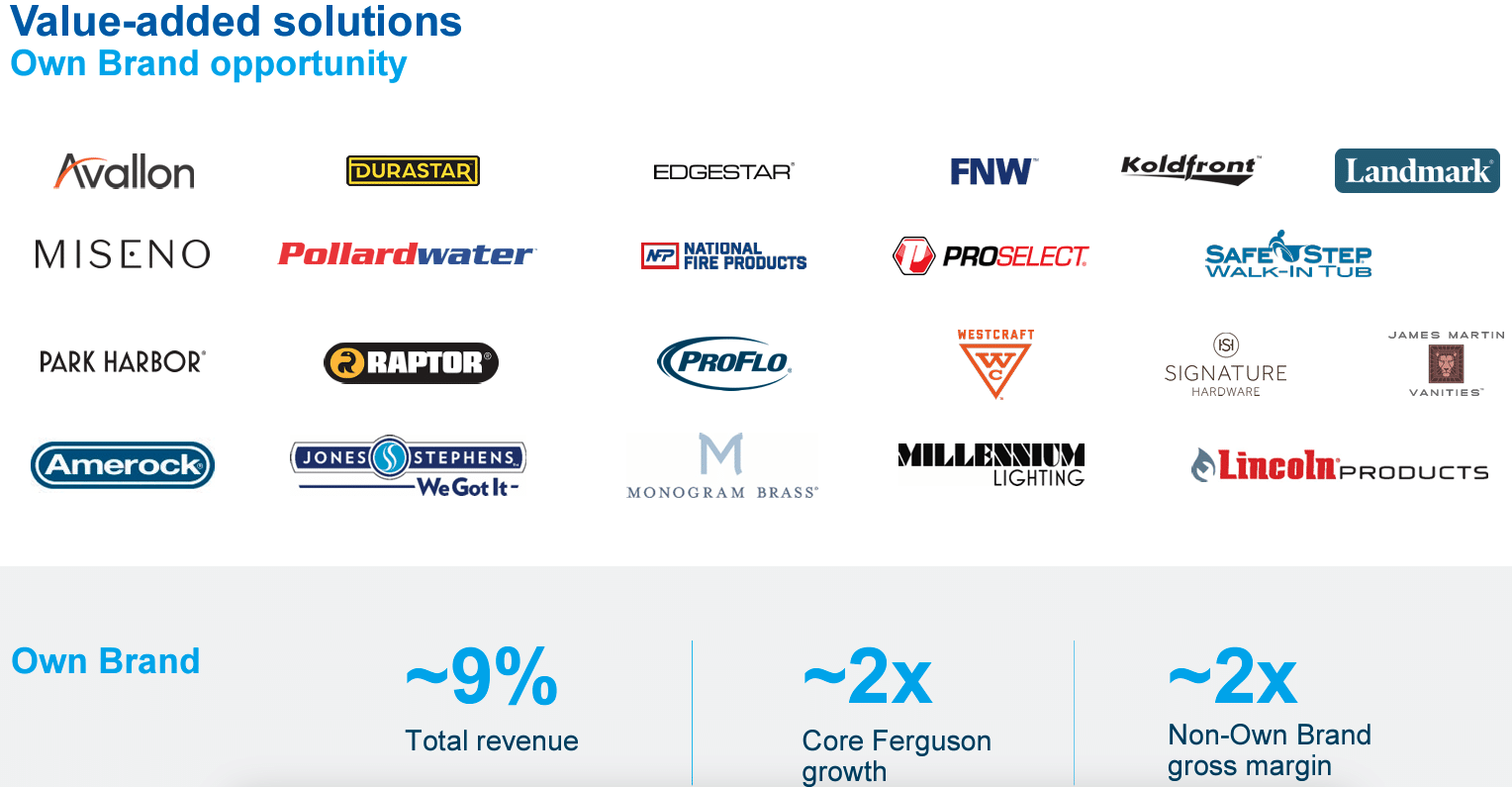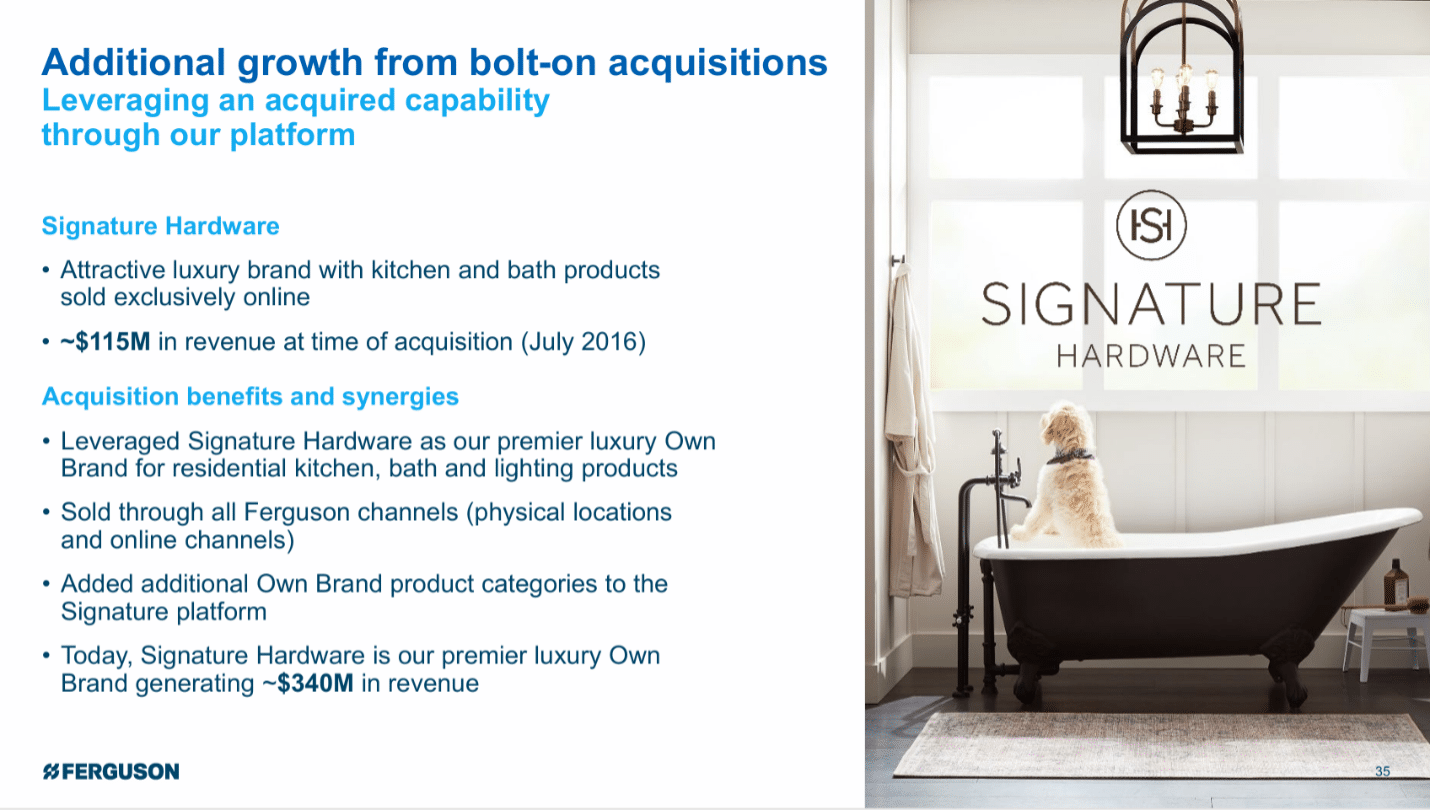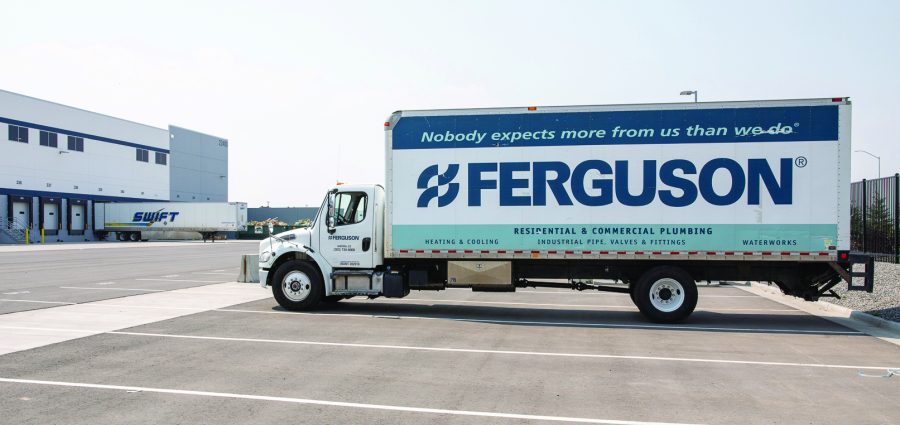Editor’s Note: This is the second in a three-part Premium series analyzing Ferguson Enterprises and its transformative growth journey in North America. See Part 1 here and stay tuned for Part 3.
In the first of this three-part MDM Case Study series, we reported on Ferguson’s growth strategy in the channels it serves from plumbing to HVACR. The company’s growth as one of the most successful “channel drifters” has made it a channel leader across plumbing, HVACR, residential remodel, waterworks, fire safety, industrial and more.
Here in Part 2, we will dive into a key accelerator of the growth in each category — Private Label (White Label) — and preview how this all comes together in the company’s digital strategy (build.com and Ferguson digital).
Ferguson’s Private Brand Strategy – Ferguson Exclusive Brands
For many distributors, finding public data on private label is difficult because of the sensitivity of the effort. Private label (Ferguson uses the term exclusive brands) can be a key market accelerator, but it also can be a sensitive subject to manage with your manufacturer partners. As a distributor, you must balance your branded manufacturer partnerships carefully to avoid alienating the branded partners that you need with private label effort.
On the distributor teams I was part of earlier in my career, we generally viewed private label opportunities on two scales.
The first is what we called the “technical/specified” scale. If you were considering a private label initiative for a product, the less technical the product, the more likely we might be able to execute a private label strategy. For example, for a large commercial HVAC installation, the very large HVAC equipment on the roof is very technical and specified by an engineer from an established manufacturer brand. It is not a realistic product to have as a private label, but the tools and accessories to install it are not as highly specified and might effectively be excellent exclusive/private label products.
The second scale we used was the classic “good, better, best” product scale. Private label products are usually most effective in distribution at the “good” and “best” quality and price ranges. Of course, this is not a 100% hard and fast rule, but the most successful private label programs in distribution have been very “move the fence programs.” In this type of program, it starts with one product set that is sourced/private labeled. If it is successful, the distributor will move the fence and add another product, and so on.
In the MDM Store
In Ferguson’s recent annual reports and an investor day presentation, Ferguson shared data that gives some insight into the company’s exclusive brand approach.
From its 2021 Annual Report:
“We have a focused product strategy that includes both branded and own brand offerings, and with over a million products across nine specialist customer groups, our extensive range can meet every customer’s need. Own brands, which represent 8.6% of revenue, offer customers high quality, ‘on trend’ products at competitive prices with excellent availability and industry-leading warranties. For the business, own brands offer higher gross margins. As such, our customers, associates, and the business all do well when we sell own brand products.”
Ferguson, like many distributors, keeps specific information on its expansion plans close to the vest and, as a public firm, it is crucial to do so. One clear thing is that the Ferguson branded product (private/white label) approach is still a key company initiative.
Ferguson’s 2023 annual report states in its business risk section: “As we expand our own brand product offerings organically and through acquisitions, we may become subject to increased risks due to our greater role in the design, sourcing, marketing and sale of those products.”

During Ferguson’s 2022 Investor Day Webcast (Jan. 13, 2022), CEO Kevin Murphy shared that the marketing of these 22 Ferguson brands represented about 9% of the company’s total annual revenue. This part of Ferguson’s product strategy is used to “give us exclusivity and a better chance to secure the project,” Murphy noted.
Ferguson currently lists many of its Ferguson Exclusive brands on Ferguson.com, with its dedicated webpage for that.
“Shop an expansive offering of brands available exclusively from Ferguson,” the website states. “All of our brands are backed by our commitment to world-class customer service.”

I found the additional slide above from that investor day presentation enlightening as it shows the results of just one of the company’s many Ferguson brands. The sales growth of Signature Hardware pre-acquisition from $115 million in 2016 to $340 million in 2020 — nearly 300% in four years — is impressive, and it shows the strength of the Ferguson Exclusive Brands program.
There are risks with this product strategy, but it appears that Ferguson understands and manages those risks effectively. The company continues to share that it is expanding Ferguson brands organically and through acquisition.
The investment and results from Ferguson brands allow the company to “use the margin profile to invest in our specifying capabilities, bringing us closer to stakeholders like end users, engineers, architects, designers, and end users,” Murphy said in the presentation.
So, What Can You Learn from Ferguson’s Exclusive Brand Approach?
As a manufacturer for every distributor you serve in your channel(s), you need a deep understanding of your product strategy for the categories you offer. Where does your branded product fit in the “good, better, best” category by distributor and category? What exclusive brand risk do you have today and in the future? With annual planning and good account level intelligence, you can be better prepared and make better decisions. If you understand where your channel distributors are today (with their product strategy) you will have a better idea of where they are headed in the future.
From a distributor’s view, exclusive brands may or may not be a fit. If they are not feasible due to your size and scale, I believe much can still be learned from the Ferguson model.
If exclusive brands are not feasible for you today, it is crucial that you still have a good (acceptable quality at lower cost) partner where you maximize margin dollars and the appropriate “better” and “best” product manufacturer partners for each category. Often you may only need two partners to cover all three levels (good, better, and best), but it is important that you have a clear strategy.
By becoming more important to fewer partners and having a clear product strategy, it is the foundation to improving your profit pull-through. Ferguson is obviously becoming more important to fewer supplier partners, and by following its playbook, you can do the same.
If you do not have a clear product strategy you will find your team might be pricing higher cost “better” and “best” products at lower good sell price margins to win orders. If that is happening — it happens all the time with many distributors — you will compress margins to maintain sales volume and take less profit to the bottom line.
Stay tuned for Part 3 in this series.
Lead photo courtesy of Ferguson.



